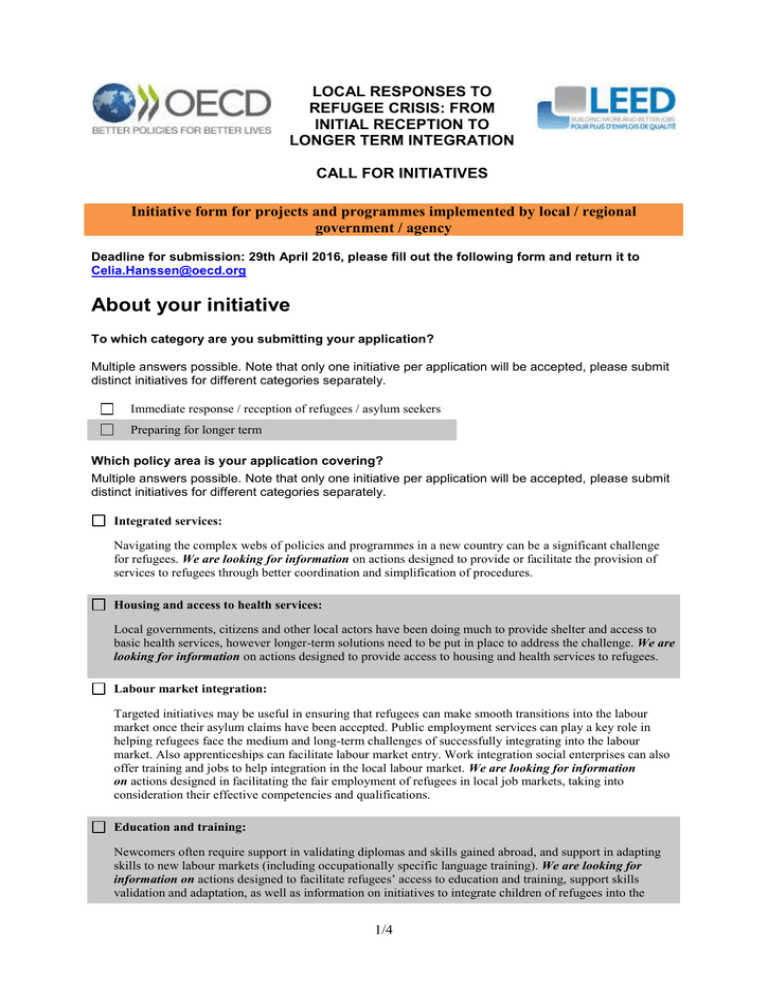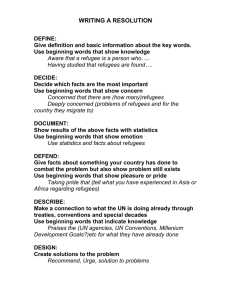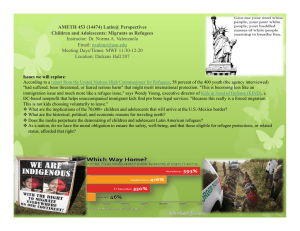Document 17800864
advertisement

LOCAL RESPONSES TO REFUGEE CRISIS: FROM INITIAL RECEPTION TO LONGER TERM INTEGRATION CALL FOR INITIATIVES Initiative form for projects and programmes implemented by local / regional government / agency Deadline for submission: 29th April 2016, please fill out the following form and return it to Celia.Hanssen@oecd.org About your initiative To which category are you submitting your application? Multiple answers possible. Note that only one initiative per application will be accepted, please submit distinct initiatives for different categories separately. Immediate response / reception of refugees / asylum seekers Preparing for longer term Which policy area is your application covering? Multiple answers possible. Note that only one initiative per application will be accepted, please submit distinct initiatives for different categories separately. Integrated services: Navigating the complex webs of policies and programmes in a new country can be a significant challenge for refugees. We are looking for information on actions designed to provide or facilitate the provision of services to refugees through better coordination and simplification of procedures. Housing and access to health services: Local governments, citizens and other local actors have been doing much to provide shelter and access to basic health services, however longer-term solutions need to be put in place to address the challenge. We are looking for information on actions designed to provide access to housing and health services to refugees. Labour market integration: Targeted initiatives may be useful in ensuring that refugees can make smooth transitions into the labour market once their asylum claims have been accepted. Public employment services can play a key role in helping refugees face the medium and long-term challenges of successfully integrating into the labour market. Also apprenticeships can facilitate labour market entry. Work integration social enterprises can also offer training and jobs to help integration in the local labour market. We are looking for information on actions designed in facilitating the fair employment of refugees in local job markets, taking into consideration their effective competencies and qualifications. Education and training: Newcomers often require support in validating diplomas and skills gained abroad, and support in adapting skills to new labour markets (including occupationally specific language training). We are looking for information on actions designed to facilitate refugees’ access to education and training, support skills validation and adaptation, as well as information on initiatives to integrate children of refugees into the 1/4 public education system. Business start-up support: Starting up their own business could be for many refugees a viable option. Tailoring business services to specific needs of the newcomers (work permit, business registration, access to finance, business premises), is very important to ensure that services reach their target. Mentors and coaches, who understand both the local context and the cultural background of the would-be-entrepreneurs, play an important role for business start-up, survival and growth. We are looking for information on actions designed to support the creation of new ventures by refugees and embed them in the local economic fabric. Raising awareness and public participation: Migration and its impact on local economies in host countries is often misunderstood by the general public, leading to political tensions and hindering the capacity to respond to the challenges. Local initiatives have an important role to play in debunking some of these misconceptions.We are looking for information on activities designed to inform populations on refugees, their needs and the potential for local development they represent. Application details: Please carefully fill out the fields below with information about your application. Context: please briefly describe the context in your city or region in terms of refugee influx, issues and challenges that need to be addressed immediately and in a longer-term to facilitate refugee reception and integration. (max 1000 words or 7000 characters) Title of the initiative Starting date of the initiative What you do: Description of needs addressed, objectives and main elements of the initiative (max 1000 words or 7000 characters) How you do it: e.g. partners involved in the initiative and their respective roles, how do you coordinate across different public services and non-public actors nationally and locally? (max 1000 words or 7000 char.) Resources dedicated to the initiative: Budget dedicated to the initiative (in local currency) Financial sources Human resources dedicated to the initiative Other resources dedicated to the initiative 2/4 Results: Achievements and how they are measured (bullet points format max 500 words or 4000 characters) Number of refugees reached by the initiative compared to the number of refugees present in the region Success factors and obstacles: Critical success factors: what worked and why (bullet points format max 500 words or 4000 characters) Biggest internal and external obstacles encountered, what needs to be changed for the initiative to work better (bullet points format max 500 words or 4000 characters) Target of the initiative Please select all appropriate options Migrants Refugees Asylum seekers 3/4 About you Contact details: Please carefully fill out the fields below in order to be contacted later on. Name of the organisation Name Surname (Family name) Job title E-mail Website Country Region/State City We are pleased to inform you that OECD/LEED is organising a workshop in Venice on 19th April, 2016 on Local answers to welcoming refugees and preparing for longer term. The workshop will pay special attention, on the one side, to the role that social enterprises have in welcoming refugees and preparing for longer term, and on the other side, to how local authorities, public institutions, social enterprises and civil society organizations, private business, and citizens can work together to provide the most impactful, tailored, and effective responses at local level. This workshop is organised in the framework of the OECD Forum on Partnerships and Local Development, for more information and to register please visit the website of the event. Note that places are limited. 4/4




